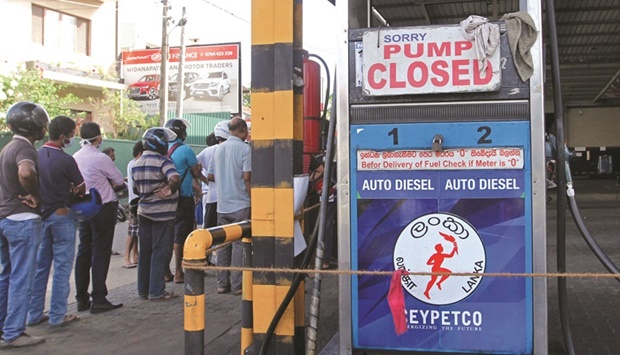Sri Lanka will shut schools and only allow fuel supplies to services deemed essential like health, trains and buses for two weeks starting today, a minister said, in a desperate attempt to deal with a severe shortage.
Sri Lanka is suffering its worst economic crisis, with foreign exchange reserves at a record low and the island of 22mn struggling to pay for essential imports of food, medicine and, most critically, fuel.
Industries like garments, a big dollar earner in the Indian Ocean nation, are left with fuel for only about a week to 10 days.
Current stocks of the country will exhaust in just under a week based on regular demand, Reuters calculations show.
Sri Lanka will issue fuel only to trains and buses, medical services and vehicles that transport food starting today until July 10, Bandula Gunewardena, the spokesman for the government cabinet, told reporters.
Schools in urban areas will be shut and everyone is urged to work from home, he said.
Inter-provincial bus service will be limited.
“Sri Lanka has never faced such a severe economic crisis in its history,” Gunewardena said.
Autorickshaw driver W D Shelton, 67, said he had waited in line for four days for fuel. “I haven’t slept or eaten properly during this time,” he said. “We can’t earn, we can’t feed our families.”
The government is talks with the International Monetary Fund (IMF) on a possible bailout, but many people can’t wait that long and demand for passports has surged.
The navy in the early hours of yesterday arrested 54 people off the eastern coast as they tried to leave by boat, a spokesman said, on top of 35 “boat people” held last week.
Embattled President Gotabaya Rajapaksa’s elder brother resigned as prime minister last month after clashes between pro- and anti-government protesters spiralled into countrywide violence that left nine dead and about 300 people injured.
An escalation of the fuel shortage could lead to a fresh wave of demonstrations.
Opposition leader Sajith Premadasa called for the government to step down.
“The country has collapsed completely due to the fuel shortage,” he said in a video statement. “The government has lied to the people repeatedly and has no plan on how to move forward.”
The government fuel stockpile stands at about 9,000 tonnes of diesel and 6,000 tonnes of petrol, the power minister said on Sunday, but no fresh shipments are due.
Lanka IOC, the local unit of Indian Oil Corporation, said it had 22,000 tonnes of diesel and 7,500 tonnes of petrol, and was expecting another 30,000 tonnes shipment of petrol and diesel combined around July 13.
Sri Lanka consumes about 5,000 tonnes of diesel and 3,000 tonnes of petrol a day just to meet its transport requirements, Lanka IOC chief Manoj Gupta said. Other big consumers are industries like apparel and textiles companies, whose exports jumped 30% to $482.7mn in May, according to data released yesterday.

People stand outside a closed Ceylon Petroleum Corporation fuel station that ran out of gasoline in Colombo yesterday.
